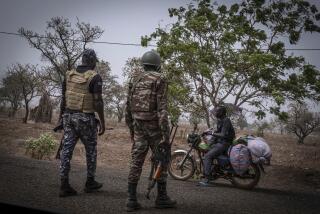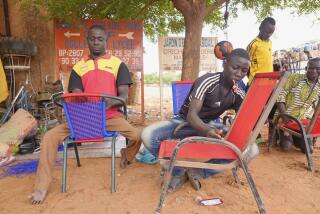Nigerians Getting High on Profits of Drug Smuggling, Authorities Say
- Share via
LAGOS, Nigeria — Officers of U.S. Customs and the Drug Enforcement Administration seized more than 100 pounds of heroin last year from Nigerian nationals at John F. Kennedy International Airport in New York. British customs and drug agents arrested about 40 Nigerians as drug smugglers at airports in England, and the British authorities say their counterparts on the Continent are reporting increased Nigerian involvement in drug smuggling.
There is clear evidence, law enforcement agencies say, that Nigerian drug-smuggling networks are operating across four continents, bringing heroin out of India and Pakistan, distributing it as far east as Taiwan and Hong Kong, or taking it westward through Africa to markets in Europe and North America.
In addition to the mounting cases of drug smuggling, U.S. authorities are becoming concerned about Nigerian involvement in crime and fraud. They say Nigerians have been implicated in a variety of illicit rackets, including conspiracies to defraud insurance companies and credit card firms.
Nigerians, because of the number of them involved, are the most conspicuous of the newcomers involved in the international drug trade. They appear to be part of a growing trend suggesting that an increasing number of Africans have discovered that huge profits can be made in the illicit drug business.
In recent months, Zambia has been rocked by a scandal involving a score of prominent figures caught smuggling Mandrax, an amphetamine manufactured in India, into Zambia. Zambian investigators learned that smugglers were concealing the drugs in new luxury cars imported to the country from South Africa. Zambian diplomats have been jailed in Holland and England for smuggling heroin.
Kenya’s police commissioner, Bernard Njinu, recently disclosed that an average of two Kenyans a month are arrested at London’s Heathrow airport for smuggling hashish, which he said was being produced in large quantities by growers in western Kenya. In West Africa, authorities in Ivory Coast have expressed alarm over the amount of illegal drugs, particularly amphetamines, in circulation among the youth.
Although Africa may seem an out-of-the-way center for heroin-smuggling racketeers, it has enjoyed some distinct advantages. Drug enforcement officials point out that it is a comparatively new route, well situated halfway between Asian sources and Western consumers. Moreover, many African countries have notoriously pliable customs officials. Finally, economically troubled Africa has a ready supply of young men with no jobs and little to lose.
The U.S. Drug Enforcement Administration posted an agent in Lagos eight months ago. One of his assignments is to assist the Nigerian police in establishing a drug enforcement unit. So far, about 30 Nigerian police have been assigned to the unit.
“They’re not very well equipped,” said the DEA agent, John Pope. “They don’t even have cars yet.”
Drug enforcement specialists say they believe that about five major smuggling rings are operating out of Lagos and are sending hundreds of Nigerians around the globe, most of them carrying relatively small amounts of heroin--usually five to seven ounces per person. In New York, the wholesale value of an ounce of heroin ranges from $5,500 to $9,000. The “street” value, once it has been diluted, is calculated at about $31,000 an ounce.
Customs officials and drug agents say that so far the preferred Nigerian method of smuggling through European and American ports of entry is “stuffing”--the heroin is concealed in condoms and inserted into body cavities.
“The Nigerians like to use a sort of ‘human wave’ technique,” a customs official in London said. “They may have 10 or 12 smugglers on a plane and figure if we catch three of them they’re still ahead of the game.”
Drug authorities say they have no idea how much Nigerian-borne heroin is getting through their net, but they assume the amount is substantial. In addition to the smuggling rings under suspicion, authorities assume a large number of free-lancers are operating, due in no small part to the economics of airline travel out of Nigeria, which in turn stems from the troubled economy of Nigeria.
Because the Nigerian currency is drastically overvalued, Nigerians who can get dollars or other hard foreign currencies are able to buy international airline tickets at one-fourth to one-fifth of their real value. The smugglers are among those taking advantage of this travel subsidy.
With travel so profitable to Nigerians, a subsidiary business has developed in Lagos in the manufacture, sale and alteration of passports and other travel documents. The problem has grown to such proportions that the U.S. Embassy in Lagos has assigned a consular officer full-time to investigate cases of fraud.
“It has gotten to the point that we assume every document that comes in here is a fake,” said the consular officer, who asked that his name not be used. “Look at this,” he said, pulling open a file drawer. It was filled with green Nigerian passports. “About 90% of these are phony or illegally altered Nigerian passports.”
To qualify for a visa to enter the United States, as a tourist or to do business, the applicant is required to show proof that he or she plans to return to Nigeria. Applicants who can provide a letter from an employer, proof of a bank account, or a dependent family usually stand a good chance of obtaining a visa.
“We get phony letters of leave,” the consular officer said, “phony employee identification cards, letters typed up on stolen company stationery, phony marriage certificates.”
The U.S. Embassy in Lagos processes about 400 visa applications a day. Most applicants are turned away after a first interview. Fraudulent applications for student visas are a continuing headache. Investigators are on the lookout for faked examination certificates from the West African Examinations Council, which are said to be selling for up to 300 naira each--officially about $300 U.S.
Joseph Segars, the U.S. consul general in Lagos, said that problems with Nigerians do not end with the visa process. About 20,000 Nigerians were given visas last year, he said, and added: “The vast majority of Nigerians visiting the United States are perfectly legitimate, law-abiding citizens. They are going for vacations or to do business. But the number who get involved in some kind of legal problem is quite surprisingly high.”
Nigerians, Segars said, account for one-tenth of 1% of all the foreign nationals visiting the United States but for 10% of the crime committed by those visitors--crime ranging from passport fraud to more serious offenses.
Segars described as “alarming” the amount of fraud detected by his own office. In one recent month, his investigators were asked to look into five suspicious insurance claims filed by Nigerians in the United States. Four of the five turned out to be fraudulent. The claims ranged from $10,000 to $25,000.
“What happens,” one of the investigators said, “is that Nigerians in the U.S. will take out accident or hospitalization insurance, come back to Nigeria and then return to the States with phony hospital bills. In one of these cases, it was a $25,000 claim on a child who was supposedly killed in an automobile accident. There was no accident, and the child was alive.”
Credit Card Fraud
Nigerians in the United States have been implicated in major credit card fraud rings, in which a credit card is issued to a fictitious person based on falsified bank statements and other documents.
In California alone, according to a Los Angeles detective, Nigerians are involved in counterfeiting that nets them hundreds of millions of dollars a year. There probably is not a state in the union, he said, where Nigerians are not involved in criminal activity.
But it is the drug smuggling that most concerns the authorities. Law enforcement agencies are pressuring the State Department to crack down on the issuance of visas to Nigerians. The State Department points out that it must issue visas in accordance with prescribed guidelines and that it is doing its best to cope with fraudulent applications.
British customs officials say they believe the Nigerians are quickly becoming more sophisticated and are using larger and more elaborate networks.
“You can be sure that if we see a Nigerian with a Pakistani or Indian stamp in his passport, he’s going to get a hard look from us,” a customs official in London said. “But now we’re seeing evidence that one team of couriers is bringing the heroin to Europe and handing it off to someone with a clean passport. We try to stay one jump ahead of them, but it isn’t easy.”
Domestic Drug Addicts
According to Western diplomatic sources in Lagos, the Nigerian government was slow to be convinced that its nationals were involved on a substantial scale in international drug traffic.
“The first thing the Nigerians told us was, ‘If you didn’t have a drug problem, there wouldn’t be any drug smugglers,’ ” one diplomat said.
Now, however, the Nigerian tone has changed.
“The Nigerians are beginning to see a few drug addicts among their own population,” a drug enforcement officer said. He pointed out that a bag of heroin a Nigerian sells at wholesale for $9,000 in New York probably cost him $200 in New Delhi.
“In Nigeria, the stuff is still pretty cheap,” he said, “and there is evidence that people are using it here. Whether they like it or not, Nigerians are connected to the problem, and they are beginning to realize it.”
More to Read
Sign up for Essential California
The most important California stories and recommendations in your inbox every morning.
You may occasionally receive promotional content from the Los Angeles Times.










